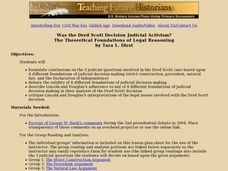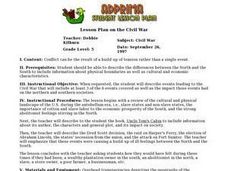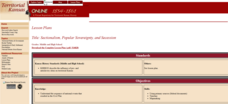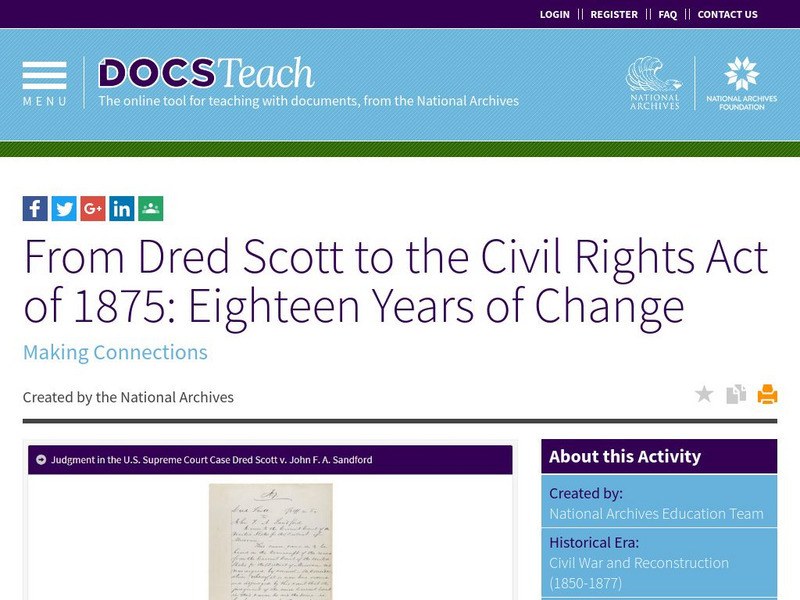Curated OER
Dred Scott and the Constitution
Students investigate the outcome of the Dred Scott case. In this human rights instructional activity, students read Justice Taney's decision about property rights and citizenship. Students write essays about the outcome of the case and...
Curated OER
Was the Dred Scott Decision Judicial Activism?
Students debate the validity of 4 different foundations of judicial decision-making. They describe Lincoln and Douglas's adherence to any of 4 different foundations of judicial decision-making in their analysis of the Dred Scott decision
Carolina K-12
Plessy v. Ferguson & the Roots of Segregation
How far in the past do the roots of Jim Crow and segregation extend? Young historians closely consider this question using detailed PowerPoint slides as a basis for discussion rather than lecture, culminating in an activity where class...
American Battlefield Trust
Pre-1860: Disunion
Using personas ranging from freed African Americans to wealthy plantation owners, young historians consider various points of view around the events in the days leading up to the Civil War including major milestones such as the Dred...
Curated OER
Underground Railroad
Eighth graders explore the Underground Railroad. For this American History lesson, 8th graders create a song about the railroad. Students analyze various symbols used during the Underground Railroad.
C-SPAN
Presidential Veto and Congressional Override
One of the key powers of the executive branch is the president's ability to pass or veto legislation proposed by Congress. Congress, the legislative branch, on the other hand, can override a president's veto. Five film clips show how the...
K20 LEARN
Analyzing Early American Figures: Analyzing History
Who were they? High school freshmen brush up on their research skills by investigating an important person in American history. They select a name, fill out a KWHL chart, and research why their person is important. Scholars then complete...
Curated OER
Maryland During the Secession Crisis
Students identify the problems Maryland encountered during the secession crisis. They analyze census data and through an examination of the resolutions made by Maryland's Southern Rights Convention of 1861.
Museum of Tolerance
Making Lemonade: Responding to Oppression in Empowering Ways
An activity focused on tolerance encourages class members to consider how they might respond when they or someone else is the target of oppression and discrimination. After researching how some key figures responded to the...
Curated OER
Black History Web Design
Each student or student team creates a web page. Young scholars research and make decisions for content of the page. Each web page should contain at least six images and six links, as well as any necessary commentary. Students indicate...
Curated OER
Latinos and the Fourteenth Amendment: A Primary Document Activity
Students explore Latinos and the Fourteenth Amendment. In this government and law lesson, students analyze the ruling in Hernandez v. Texas. Students predict how the United States would be different if the court had made an alternated...
Curated OER
A Time for Justice
High schoolers engage in a lesson that focuses on the development of The Bill Of Rights in the United States. They conduct research using a variety of resources. Students two focus questions in order to guide the information search. They...
Curated OER
Escape to Freedom
Students read 'They Called Her Moses," create a wanted poster for Tub man, compose a journal entry imagining they are William Still, and in groups, create a newspaper depicting the incident of the runaway slaves and events from the time...
Curated OER
A Time for Justice
Students explain the protections and privileges of individuals and groups in the United States.
Curated OER
Lesson Plan on the Civil War
Fifth graders identify events leading to the Civil War and explain the impact the events had on northern and southern societies.
Curated OER
Lincoln-Douglas Debates of 1858
Students examine the transcripts of the 1858 Lincoln-Douglas debates and create a platform for each candidate in the 1858 Senate race. They utilize the candidates' arguments to explore the historical and political impact.
Curated OER
Sectionalism, Popular Sovereignty, and Secession
Pupils examine sequence of national events that resulted in the Civil War by using primary sources, and creating timelines and maps.
US National Archives
National Archives: From Dred Scott to the Civil Rights Act of 1875
The Dred Scott case decided that African Americans were not citizens of the United States. However, 18 years later they would have citizenship and many other rights. Learners will examine the following documents to understand how and why...
US National Archives
Docsteach: From Dred Scott to Civil Rights Act of 1875: Eighteen Years of Change
In 1857, the U.S. Supreme Court ruled in the Dred Scott decision that African-Americans were not citizens of the United States. Yet within 18 years, Black Americans would not only have citizenship, but would be guaranteed the right to...
iCivics
I Civics: Dred Scott v. Sandford (1857)
This mini-lesson covers the basics of the Supreme Court decision that determined that Dred Scott, having lived in a free territory, was not entitled to his freedom. Students learn about the impact of the Court's decision, and how it was...



















